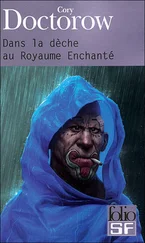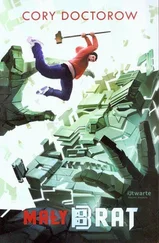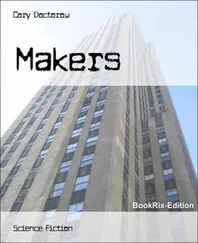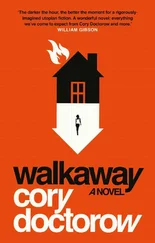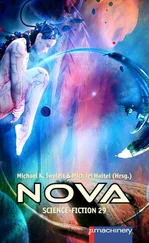Cory Doctorow
Little Brother
This book is distributed under a Creative Commons Attribution-NonCommercial-ShareAlike 3.0 license. That means:
You are free: to Share — to copy, distribute and transmit the work to Remix — to adapt the work
Under the following conditions: Attribution. You must attribute the work in the manner specified by the author or licensor (but not in any way that suggests that they endorse you or your use of the work). Noncommercial. You may not use this work for commercial purposes. Share Alike. If you alter, transform, or build upon this work, you may distribute the resulting work only under the same or similar license to this one. For any reuse or distribution, you must make clear to others the license terms of this work. The best way to do this is with a link http://craphound.com/littlebrother Any of the above conditions can be waived if you get my permission
More info here.
I wrote Little Brother in a white-hot fury between May 7, 2007 and July 2, 2007: exactly eight weeks from the day I thought it up to the day I finished it (Alice, to whom this book is dedicated, had to put up with me clacking out the final chapter at 5AM in our hotel in Rome, where we were celebrating our anniversary). I’d always dreamed of having a book just materialize, fully formed, and come pouring out of my fingertips, no sweat and fuss — but it wasn’t nearly as much fun as I’d thought it would be. There were days when I wrote 10,000 words, hunching over my keyboard in airports, on subways, in taxis — anywhere I could type. The book was trying to get out of my head, no matter what, and I missed so much sleep and so many meals that friends started to ask if I was unwell.
When my dad was a young university student in the 1960s, he was one of the few “counterculture” people who thought computers were a good thing. For most young people, computers represented the de-humanization of society. University students were reduced to numbers on a punchcard, each bearing the legend “DO NOT BEND, SPINDLE, FOLD OR MUTILATE,” prompting some of the students to wear pins that said, “I AM A STUDENT: DO NOT BEND, SPINDLE, FOLD OR MUTILATE ME.” Computers were seen as a means to increase the ability of the authorities to regiment people and bend them to their will.
When I was 17, the world seemed like it was just going to get more free. The Berlin Wall was about to come down. Computers — which had been geeky and weird a few years before — were everywhere, and the modem I’d used to connect to local bulletin board systems was now connecting me to the entire world through the Internet and commercial online services like GEnie. My lifelong fascination with activist causes went into overdrive as I saw how the main difficulty in activism — organizing — was getting easier by leaps and bounds (I still remember the first time I switched from mailing out a newsletter with hand-written addresses to using a database with mail-merge). In the Soviet Union, communications tools were being used to bring information — and revolution — to the farthest-flung corners of the largest authoritarian state the Earth had ever seen.
But 17 years later, things are very different. The computers I love are being co-opted, used to spy on us, control us, snitch on us. The National Security Agency has illegally wiretapped the entire USA and gotten away with it. Car rental companies and mass transit and traffic authorities are watching where we go, sending us automated tickets, finking us out to busybodies, cops and bad guys who gain illicit access to their databases. The Transport Security Administration maintains a “no-fly” list of people who’d never been convicted of any crime, but who are nevertheless considered too dangerous to fly. The list’s contents are secret. The rule that makes it enforceable is secret. The criteria for being added to the list are secret. It has four-year-olds on it. And US senators. And decorated veterans — actual war heroes.
The 17 year olds I know understand to a nicety just how dangerous a computer can be. The authoritarian nightmare of the 1960s has come home for them. The seductive little boxes on their desks and in their pockets watch their every move, corral them in, systematically depriving them of those new freedoms I had enjoyed and made such good use of in my young adulthood.
What’s more, kids were clearly being used as guinea-pigs for a new kind of technological state that all of us were on our way to, a world where taking a picture was either piracy (in a movie theater or museum or even a Starbucks), or terrorism (in a public place), but where we could be photographed, tracked and logged hundreds of times a day by every tin-pot dictator, cop, bureaucrat and shop-keeper. A world where any measure, including torture, could be justified just by waving your hands and shouting “Terrorism! 9/11! Terrorism!” until all dissent fell silent.
We don’t have to go down that road.
If you love freedom, if you think the human condition is dignified by privacy, by the right to be left alone, by the right to explore your weird ideas provided you don’t hurt others, then you have common cause with the kids whose web-browsers and cell phones are being used to lock them up and follow them around.
If you believe that the answer to bad speech is more speech — not censorship — then you have a dog in the fight.
If you believe in a society of laws, a land where our rulers have to tell us the rules, and have to follow them too, then you’re part of the same struggle that kids fight when they argue for the right to live under the same Bill of Rights that adults have.
This book is meant to be part of the conversation about what an information society means: does it mean total control, or unheard-of liberty? It’s not just a noun, it’s a verb, it’s something you do.
This book is meant to be something you do, not just something you read. The technology in this book is either real or nearly real. You can build a lot of it. You can share it and remix it (see THE COPYRIGHT THING, below). You can use the ideas to spark important discussions with your friends and family. You can use those ideas to defeat censorship and get onto the free Internet, even if your government, employer or school doesn’t want you to.
Making stuff: The folks at Instructables have put up some killer HOWTOs for building the technology in this book. It’s easy and incredibly fun. There’s nothing so rewarding in this world as making stuff, especially stuff that makes you more free: http://www.instructables.com/member/w1n5t0n/
Discussions: There’s an educator’s manual for this bookthat my publisher, Tor, has put together that has tons of ideas for classroom, reading group and home discussions of the ideas in it.
Defeat censorship: The afterword for this book has lots of resources for increasing your online freedom, blocking the snoops and evading the censorware blocks. The more people who know about this stuff, the better.
Your stories: I’m collecting stories of people who’ve used technology to get the upper hand when confronted with abusive authority. I’m going to be including the best of these in a special afterword to the UK edition (see below) of the book, and I’ll be putting them online as well. Send me your stories at doctorow@craphound.com, with the subject line “Abuses of Authority”.
I’m a Canadian, and I’ve lived in lots of places (including San Francisco, the setting for Little Brother), and now I live in London, England, with my wife Alice and our little daughter, Poesy. I’ve lived here (off and on) for five years now, and though I love it to tiny pieces, there’s one thing that’s always bugged me: my books aren’t available here. Some stores carried them as special items, imported from the USA, but it wasn’t published by a British publisher.
Читать дальше

